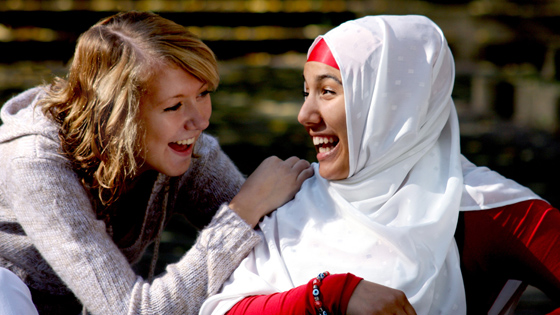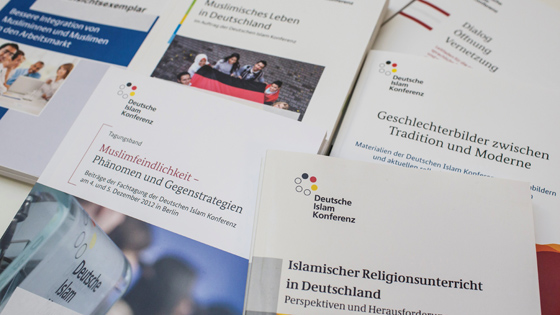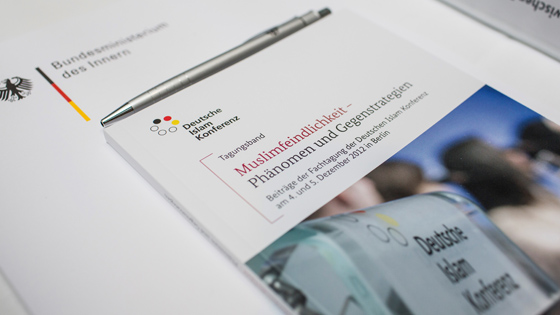The DIK’s track record to date ,
The work of the DIK is subdivided into phases that coincide with the legislative terms. The DIK’s current phase, which started in 2022, was preceded by phases which ran from 2006 to 2009, from 2009 to 2013, from 2014 to 2017 and from 2018 to 2021.
During the first three phases (founding phases), the DIK met and worked in fixed formats and forums. It had working and steering groups devoted to particular topics and with specific tasks and membership. This work was aimed at reaching an exchange and understanding on specific questions and issues and finding solutions and rules for problems that arise in daily life, for example related to religious instruction at public schools, the teaching of Islamic theology at universities, Muslim welfare and Islamic pastoral care, the building of mosques and the prevention of anti-Muslim hostility. The results were recorded in recommendations, guidelines and informational publications.
They laid the groundwork for the DIK from 2018 onwards (implementation phases). Since then – in the 19th and 20th legislative terms – the DIK has worked in thematic, variable and flexible formats. Depending on the subject, the aim and the actors and organisations concerned, different participants may be involved in dialogue and events. Since 2018, the DIK has drawn on a broader, more diverse range of participants to reflect changing Muslim life in Germany.
History of the German Islam Conference (DIK)
2024.05.27 DIK expert meeting on antisemitism
The expert meeting "Antisemitism in Muslim communities – challenges and approaches for action" was held at the Federal Ministry of the Interior with the involvement of Dr Felix Klein, the Federal Government Commissioner for Jewish Life in Germany and the Fight against Antisemitism. The meeting was attended by numerous Muslim stakeholders and institutions, many of which have for years been actively engaged in the fight against antisemitism. Jewish and Muslim participants in the interreligious dialogue and government representatives were also present.
2023.10.17 Declaration issued by Islamic associations and response of Muslim civil society following the events of 7 October 2023
Following the Hamas terrorist attack on Israel, State Secretaries Seifert and Engelke invited Islamic organisations to an exchange at the Federal Ministry of the Interior in Berlin. The meeting was called to discuss the impacts of the current events in the Middle East on social cohesion and security in Germany. The Islamic associations and communities represented at the meeting drafted a joint declaration calling for peaceful exchange and empathy for the victims of the conflict. In the weeks and months that followed, the dialogue was continued in various formats, involving among others Muslim civil society.
2023.09.30 First undergraduates finish their course in Islamic theology at the Islamkolleg Deutschland
The first class of students completing basic and advanced training for Muslim religious staff graduated from the Islamkolleg Deutschland. The Federal Government had set itself the goal of promoting training independent of foreign influence for imams and other religious staff in Muslim congregations in Germany. Handing over the study certificates to the first graduates is an important step towards this goal.
2023.06.29 Report of the Independent Expert Group on Anti-Muslim Sentiment (UEM) is published
The Independent Expert Group, which was convened in September 2020, presents its report to State Secretary Juliane Seifert at a press conference held at the Federal Ministry of the Interior and Community.
The UEM was fully autonomous in selecting working methods and focus areas for its report.
The UEM began its work in September 2020. By mid-2023, some 90 plenary sessions, working group meetings and roundtable discussions with experts had taken place.
2023.06.10 Event marks the conclusion of the initiative "Mosques for integration: Open, connected, cooperative"
A conference marks the official conclusion of the multi-year funding initiative "Mosques for integration: Open, connected, cooperative" (Moscheen für Integration - Öffnung, Vernetzung, Kooperation). Numerous Muslim and Alevi congregations take part in the conference, and their commitment to the initiative is honoured. The conference offers insights into the results of the initiative and focuses on civil-society engagement and on networks of congregations.
2022.12.07 DIK event kicks off its work in the 20th legislative term
A kick-off event at the BMI in Berlin marks the official launch of a new DIK phase. It is attended by some 160 people representing Germany’s Muslim community, federal ministries, federal states, municipalities, Christian churches, the Jewish community, the academic community and other areas of society. Federal Minister of the Interior Nancy Faeser opens the event with a keynote speech on Islam policy, describing the DIK as a driver of the discussion of policy issues related to Islam. In addition, she highlights the focus of the current DIK phase on issues including preventing and combating anti-Muslim hostility, continuing to improve the participation of Muslims and Muslim communities in society and strengthening imam training.
2022.05.05 Workshop discussion on continuing the DIK in the 20th legislative term
Following Minister Faeser’s announcement that she will continue and enhance the DIK, a consultation process to involve Muslim voices and positions in the planning phase is launched. A workshop is organised in Berlin to discuss potential priorities for the DIK. Subsequently, the BMI defines areas of action and objectives for the DIK.
2021.06.15 Islamkolleg in Osnabrück opens with an official ceremony
The start of training for Islamic religious personnel at the Islamkolleg Deutschland e.V. (IKD) higher-education institution in Osnabrück marks an important milestone on the way to achieving the integration policy aim of expanding training for imams in Germany. The training programme is supported under the auspices of the DIK and with DIK funding. It is the first programme to offer training for Islamic religious personnel which is not affiliated with any Muslim umbrella organisations or country of origin and is conducted in German. Training is provided by Islamic theologians from Germany.
2021.04.28 DIK study on Muslim life in Germany is published
The study carried out by the Federal Office for Migration and Refugees on behalf of the DIK up-dates the previous study from 2008, with an extrapolation of the number of Muslims from 2015. It offers current and representative data on the number of Muslims living in Germany, the structures of religious life, religious practices in everyday life and integration issues.
2020.01.09 DITIB starts training programme for imams and other religious leaders in Germany
In January 2020, Germany’s largest Muslim umbrella organisation, DITIB, begins training imams and other Islamic religious leaders in Germany independently and in the German language, creating an alternative to state-appointed imams sent from Turkey. State Secretary Markus Kerber, who as part of his work with the DIK conducted numerous talks with the Turkish religious authority in Ankara and with DITIB at its headquarters in Cologne, attends the opening and praises this new development: "This day has the potential to ensure that, in future, much of the Islam practised in Germany will better reflect the real lives of Muslims living here."
2019.11.15 New initiative funds mosques’ integration efforts
At a kick-off event in Berlin, Federal Minister of the Interior Horst Seehofer officially launches the funding project "Moscheen für Integration – Öffnen, Vernetzen, Kooperieren" (Mosques for integration: open, connected, cooperative), which is at the heart of the DIK’s focus on integration policy. The project is intended to support the broad range of social and civil-society activities of mosque congregations in Germany, to put them on a more professional footing and coordinate them more closely with the congregations’ non-Muslim neighbours.
2019.05.29 State Secretary Kerber visits sites of Muslim life
During Ramadan, from 29 to 31 May, Dr Markus Kerber, the state secretary at the Federal Ministry of the Interior who is responsible for the DIK, takes part for the first time in discussions at various sites of Muslim life in four federal states. The discussions cover issues ranging from the representation of Muslim interests by Muslim organisations to the practice of Muslim advanced training, social counselling, chaplaincy, social welfare and Islamic congregations and their integration in local communities. State Secretary Kerber also praises existing models for training imams in Germany.
2018.11.28 DIK kick-off event for the start of its work in the 19th legislative term
The DIK marks the start of its work in the 19th legislative term with an event on 28 and 29 November in Berlin hosted by Federal Minister of the Interior Horst Seehofer. Participants represent a broad spectrum of Muslim life in Germany as well as the fields of politics, academia, public administration and the media. In this legislative term, the DIK uses flexible formats and concentrates on practical issues in daily life, such as the training of imams, prevention of anti-Muslim hostility, intra-Muslim dialogue and the integration of Muslim congregations at local level.
2017.03.14 DIK presents recommendations on Muslim chaplaincy in public institutions
To conclude the third phase of its work, the DIK adopts a document on chaplaincy in public institutions as a topic of the German Islam Conference, which contains recommendations on Muslim chaplaincy at hospitals, in prisons and in the armed forces.
2016.09.27 10th anniversary of the DIK
On 27 September 2016, 130 guests attend an official ceremony at the Umspannwerk event location, a former electrical substation in the Kreuzberg district in Berlin. In his welcoming remarks, then-Federal Minister of the Interior Thomas de Maizière notes, "the German Islam Conference ten years on: that is ten years of working together, building trust, creating dependability and expanding knowledge."
2015.11.10 DIK publications on social services
As a product of its intensive concentration on social welfare, the DIK publishes recommendations occasioned by a second conference on the topic along with a study on social services of the religious umbrella organisations represented in the German Islam Conference and their affiliated congregations.
2014.03.24 Focus on Muslim social welfare and chaplaincy
The DIK makes Muslim social welfare and Islamic chaplaincy the focus of its work in the 18th legislative term. Its efforts culminate in January 2015 in a major expert conference on social welfare, where experts discuss current challenges in child and youth services as well as care and assistance for the elderly.
2013.10.09 DIK publishes a brochure with recommendations
The DIK’s 50-page brochure documents the results of its work from 2006 to 2013, with guidelines, recommendations and declarations on different aspects with practical relevance for daily life.
2013.05.07 DIK declaration on fostering social cohesion and preventing polarisation
The final DIK plenary in the 17th legislative term focuses on preventing polarisation in society. The DIK publishes a declaration condemning anti-Muslim hostility, antisemitism among Muslims, and Islamism as extremism based on religion; it also launches an initiative to fund relevant projects.
2012.12.04 DIK expert conference on anti-Muslim hostility and strategies for countering it
At its two-day conference, the DIK demonstrates its support for more action to fight anti-Muslim hostility. The conference takes stock of this phenomenon and confirms the great need for more prevention. The conference proceedings are documented in a publication which appears in 2013. It is the first time that this issue is publicly debated at federal level at the Federal Ministry of the Interior.
2012.04.19 DIK adopts declaration opposing domestic violence and forced marriage
In addressing the issue of gender equality as a shared value, the DIK adopts a declaration opposing domestic violence and forced marriage. It also publishes a brochure on improving the integration of Muslims in the labour market which is the result of efforts by the working group on this issue; among other topics, the brochure covers dealing with conflicts and diversity in the workplace and opening the labour market to other cultures. In addition, it sheds light on Muslims’ access to the labour market.
2012.04.17 DIK study on Islamic congregations in Germany is published
At the DIK’s request, the ZfTI centre for Turkish studies and integration research and the Federal Office for Migration and Refugees compile studies on Islamic congregations and Islamic religious leaders. Their research provides the first comprehensive overview of Islamic congregations, their services and structures, and of the origin, training, tasks and residence status of their religious leaders.
2011.03.29 DIK publishes guidelines on advanced training for Islamic religious leaders
The guidelines, "Dialog – Öffnung – Vernetzung" (dialogue, opening, connection), are directed at local governments, actors at local level and Islamic congregations and provide information to aid in planning and carrying out training projects. Numerous projects across Germany on advanced training for religious leaders in Islamic congregations are funded on the basis of these guidelines.
2011.02.13 DIK conference on Islamic religious instruction in Germany
The DIK conference "Islamischer Religionsunterricht in Deutschland – Perspektiven und Herausforderungen" (Islamic religious instruction in Germany: perspectives and challenges) is held in Nuremberg on 13 and 14 February. Topics include the progress on introducing Islamic religious instruction at public schools in Germany’s federal states and the role of Muslim organisations and actors in the process.
2009.06.25 DIK drafts guidelines on practical religion-related issues for schools
The conclusions of the DIK working group on the role of religion within the German constitutional framework include information and recommendations on head scarves and other religious clothing, participation in physical education and swimming classes, and religious holidays and Ramadan.
2009.06.24 DIK study on Muslim life in Germany is published
The study produced and published by the Federal Office for Migration and Refugees on behalf of the DIK provides the first representative information on Muslims living in Germany, including their number, their countries of origin, the different varieties of Islam they follow and their religious practices.
2008.12.08 8 December 2008: DIK website is launched
The DIK launches its own website at www.deutsche-islam-konferenz.de, documenting its organisation and the results of its work.
2008.03.13 DIK presents recommendations on mosque construction and Islamic burial
The DIK working groups present their first set of recommendations, including on the conditions for introducing Islamic religious instruction in public schools, on the building of mosques and on the practice of Islamic burials.
2007.05.02 DIK commissions study on Muslim life in Germany
To remedy the lack of representative data on Muslims in Germany, the DIK tasks the Federal Office for Migration and Refugees with producing a study on Muslim life in Germany. The study is published in June 2009.
2006.09.28 Government statement on the DIK
To mark the launch of the DIK, Federal Minister of the Interior Wolfgang Schäuble reads a government statement before the German Bundestag. The following sentence in particular receives a great deal of attention: "Islam is part of Germany and part of Europe, it is part of our present and part of our future. Muslims are welcome in Germany." Federal Minister Schäuble also says, "I hope that the German Islam Conference will be able not only to find practical solutions, but also to increase understanding, empathy, peace and tolerance and above all to create more communication and diversity and in this way help to enrich our country."
2006.09.27 First meeting of the DIK in Charlottenburg Palace, Berlin
Federal Minister of the Interior Wolfgang Schäuble welcomes Muslim and government representatives to the first meeting of the DIK in Berlin. At the meeting, three working groups (The German social system and value consensus, The role of religion within the German constitutional framework and Media and the private sector as mediators) and the Round Table on Security and Islamism are established.




